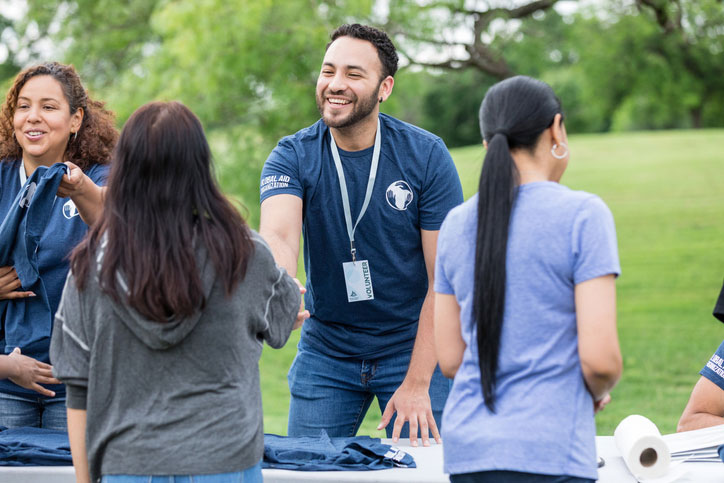Written by Scott Wilson

Social workers from Key West to Pensacola understand that education is the key to success in the field. The more you know about the challenges your clients face, the better equipped you are to deal with them. And the more focused training you can get in the latest resources and techniques in every population and specialization area, the higher your skills are for meeting people’s needs.
This is part of what drives the ongoing requirements for continuing education that you’ll need to meet to keep your license here. But CE hours can be piecemeal, just little disconnected dots of information that don’t quite dive into subjects the way a longer or more structured course can do.
Somewhere between week-long seminar and a full college degree are certificate studies in social work.
You’ll find them at social work schools up and down the state, from FSU in Tallahassee down to Barry University in Miami Shores, and in fields of study that can fuel your learning appetite no matter what your speciality.
Where Do Social Work Certificates Come Into the Picture in Florida Social Services?
A social work certificate is a short, organized course of study at the college level that aims at a specific subject and is wrapped up in something less than a year. A certificate program may have a handful of different classes, but without the breadth of a genuine degree program.
The primary use for social work certificates in Florida as elsewhere is to boost your knowledge and skills in the specialized area that the certificate covers. This can be attractive for all sorts of different reasons:
- You didn’t have the time to fit those studies in with your regular degree program.
- The school at which you studied social work didn’t offer the specialization in question.
- You have decided after spending some time in the field to expand or change your own focus in social work practice.
Parsing the Difference Between a Certificate and Certification is Particularly Important in Florida
 You wouldn’t be blamed for thinking that getting a social work certificate is just what you need to become a Certified Master Social Worker (CMSW) in Florida. But despite the similar names, these are two different meanings at play for the word “certify.”
You wouldn’t be blamed for thinking that getting a social work certificate is just what you need to become a Certified Master Social Worker (CMSW) in Florida. But despite the similar names, these are two different meanings at play for the word “certify.”
The programs described here are all educational certificates. You go through the sequence of classes and pass your assignments and quizzes with the necessary scores, and the college awards you a certificate to show that you have completed the course of study. In this sense, it’s exactly like a degree.
That’s different from being certified by the state to practice as a master social worker or CMSW. Official blessing from the Florida Board of Clinical Social Work, Marriage and Family Therapy and Mental Health Counseling involves meeting both educational requirements, experiential prerequisites, background checks, and passing an approved national exam. If you’ve done all that, you can be certified by the state as being qualified to work in the field.
The educational requirement for the CMSW credential is a CSWE-accredited MSW, with no exceptions. You can certainly earn a post-master’s certificate in a specialty area once you’ve earned CMSW status, but you can’t skip the MSW to get there.
And, of course, academic certificates in social work are also separate from professional certification, which is offered by independent bodies such as the National Association of Social Workers (NASW), which simply validates your skills in a specific type of social work — but doesn’t actually teach you those skills or by itself give you official approval to work in the state.
In some senses, these are like a minor or concentration plan that you might find incorporated into a regular BSW or MSW degree. In fact, at some colleges, you can opt to take their certificate programs as a part of your degree or as a stand-alone certificate after you graduate.
These are the extra shots of focused education that hone your expertise at working with military members and families around Naval Air Station Pensacola, or as a palliative care expert with those nearing the end of their lives with Haven Hospice in Gainesville. They build on what you learned through your general education in social work to make you a true expert in your specialty.
The Coursework in Florida Social Work Educational Certificates Depends on the Focus Area and Level

The coursework you can expect in Florida social work certificate programs are regular college classes, grouped together in a way that builds a particular set of skills.
In Florida, you will find them under such subjects as:
- Child Welfare Practice Certificate
- Gerontology/Aging Studies Certificate
- Leadership in Executive and Administrative Development Certificate
- Medical Social Work Certificate
- Social Work and the Law Undergraduate Certificate
- Undergraduate Certificate in Aging Studies
- Undergraduate Certificate in Children’s Services
- Graduate Certificate in Military Social Worker
- Undergraduate Certificate in Spanish for Social Workers
- Graduate Certificate in Addictions
- Graduate Certificate in Child Welfare
- Graduate Certificate in Health Promotion
- Graduate Certificate in Health Economics
- Graduate Certificate in Management in Social Work
- Post-MSW Certificate in Clinical Practice
As you can tell from some of the titles, the class levels offered can be at the undergraduate level which are often earned right alongside a BSW effectively making it a minor concentration. At the graduate level, they can serve as post-bachelor’s or post-master’s options that add key skills for specialization. There are even post-graduate studies, designed to deliver required coursework for clinical licensure for students who originally specialized in a macro or mezzo practice area with a master’s degree.
All of those options are available through a handful of exceptional schools within the Florida state public university system that also offer CSWE-accredited MSW and BSW programs:
Florida Gulf Coast University
Marieb College of Health and Human Services, Department of Social Work
Public University

Medical Social Work Certificate (on-campus)
Medical Social Work, no concentration
Also Offers:
- BSW
- Standard Two-Year MSW
- Advanced Standing MSW
Florida International University
Robert Stempel College of Public Health and Social Work, School of Social Work
Public University

Certificate in Child Welfare Services (on-campus)
Graduate Certificate in Addictions (on-campus)
Graduate Certificate in Child Welfare (on-campus)
Graduate Certificate in Social Work Practice for the Elderly (on-campus)
Also Offers:
- BSW
- Standard Two-Year MSW
- Advanced-Standing MSW
- PhD in Social Welfare
- MSW-JD
- MSW-MPH
- Minor in Social Welfare
- Post-MSW Graduate Certificate in Clinical Practice
Florida State University
College of Social Work
Public University

Graduate Certificate in Child Welfare Practice (on-campus, online)
Graduate Certificate in Gerontology (on-campus, online)
Graduate Certificate LEAD in Social Work (on-campus, online)
Clinical Social Work, Social Leadership
Also Offers:
- BSW
- Standard Two-Year MSW
- Advanced-Standing MSW
- PhD in Research Methods and Teaching
University of Central Florida
College of Health Professions and Sciences, School of Social Work
Public University

Aging Studies Undergraduate Certificate (on-campus, online)
Children’s Services Undergraduate Certificate (on-campus, online)
Spanish for Social Work Undergraduate Certificate (on-campus, online)
Military Social Work Graduate Certificate (on-campus, online)
Also Offers:
- Minor in Aging Studies
- Nonprofit Management Minor
- BSW
- Standard Two-Year MSW
- Advanced-Standing MSW
Just as with the degrees themselves, you’ll find that the difficulty of the courses will vary depending on the level of the certificate. Post-graduate coursework is naturally more advanced, relying on your existing master’s credentials to have laid important groundwork for understanding hard concepts. Graduate, or post-bachelor’s, certificate work is still plenty challenging, but it builds on your bachelor’s training and doesn’t assume more advanced knowledge.
Online Certificate Options in Florida Help You Fit Specialized Studies Into a Busy Life

Colleges all over the state of Florida offer certificate programs in social work, probably including one or more near you. Still, you might find that online Florida social work certificates are a better fit for your needs at this stage of your career.
For starters, the online options open up all of those certificate options for you, not just the ones that are right down the street. That gives you the chance to find a perfect fit between the coursework and your professional interests.
If you are on the job in Miami-Dade working with an organization like the Center for Family and Child Enrichment and decide that the Child Welfare Practice Certificate from FSU all the way up in Tallahassee is the best choice for your needs, the online options means you don’t have to compromise with something local.
Online studies are a perfect fit for the goal and duration of most college certificate programs in social work.
Next, online programs typically offer asynchronous, flexible participation through online video streaming, collaborative LMS (Learning Management Systems), chat rooms, or email connections. That makes them a breeze to fit in around your existing personal and professional obligations.
Finally, they can be more efficient ways to spend your time and money on social work education. Without a commute to class, you keep your costs down, and because schools don’t have to budget for classroom space or AC, they can offer the studies at a lower cost than you might otherwise find.
Stacking a Clinical Certificate on a Generalist MSW to Qualify for LCSW Licensure in Florida
Florida social work certificates don’t, by themselves, lead you to jobs or licensure in particularly social work fields in the Sunshine State. But they can be an important part of a larger career plan.
In terms of qualifying you for particular types of jobs, a certificate can help your expertise stand out against the competition in various specializations. You may not find that a Child Welfare Practice Certificate is listed as a requirement for social work jobs working with kids and families, but it will certainly help float your resume to the top of the stack for those positions.
For licensure, there’s no way around earning a full Master of Social Work degree to qualify as an LCSW or CMSW in Florida.
If your MSW was a generalist program that qualified you for mezzo-level jobs in the community, but without the additional required clinical coursework needed to become an LCSW, a certificate can bridge the gap. You need at total of 24 semester hours of coursework in theories of human behavior and clinical services to qualify for that license according to the Florida Board of Clinical Social Work, Marriage & Family Therapy and Mental Health Counseling.
A dedicated Post-MSW Certificate in Clinical Practice will deliver the required coursework without sending you back for a whole new degree—and put you on track for clinical practice, if that’s your goal.
New options for social work certificate studies will continue to emerge in Florida as society shifts and our understanding of evidence and practices evolve. To keep yourself current and develop your career in the direction that does the most good, social work certificates will continue to be a valuable tool.
